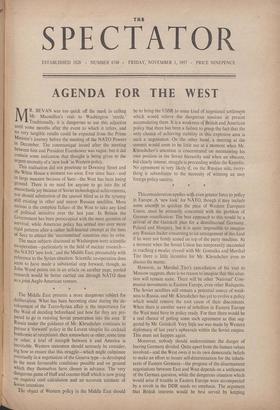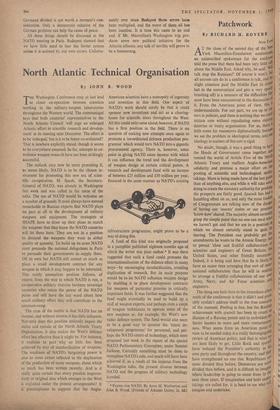AGENDA FOR THE WEST
MR. BEVAN was too quick off the mark in calling Mr. Macmillan's visit to Washington 'sterile.' Traditionally, it is dangerous to use this adjective until some months after the event to which it refers, and no very tangible results could be expected from the Prime Minister's journey before the meeting of the NATO Powers in December. The communiqué issued after the meeting between him and President Eisenhower was vague, but it did Contain some indication that thought is being given to the urgent necessity of a 'new look' in Western policy. This realisation did not penetrate to Downing Street and the White House a moment too soon. Ever since Suez—and in large measure because of Suez—the West has been losing ground. There is no need for anyone to go into fits of masochistic joy because of Soviet technological achievements, nor should admiration of the sputnik blind us to the tyranny still existing in other and nearer Russian satellites. More serious is the complete failure of the West to take any kind of political initiative over the, last year. In Britain the Government has been preoccupied with the mere question of survival, while American policy has settled into ever more rigid patterns after a rather half-hearted attempt at the time of Suez to attract the 'uncommitted' countries into its orbit.
The main subjects discussed at Washington were scientific co-operation—particularly in the field of nuclear research— the NATO 'new look,' and the Middle East; presumably with reference to the Syrian situation. Scientific co-operation does seem to have made a substantial step forward, though, as John Wood points out in an article on another page, pooled research would be better carried out through NATO than as a joint Anglo-American venture.
* • * * The Middle East presents a more dangerous subject for deliberation. What has been becoming clear during the de- velopment of the Turco-Syrian affair is the importance for the West of deciding beforehand just how far they are pre- pared to go in resisting Soviet penetration into the area. If Russia under the guidance of Mr. Khrushchev continues to pursue a 'forward' policy in the Levant (despite his cocktail bonhomie at receptions), then somewhere or other, some time or other, a trial of strength between it and America is inevitable. Western statesmen should seriously be consider; jag how to ensure that this struggle—which might culminate eventually in a negotiation of the Geneva type—is developed in the most favourable conditions possible and on ground which they themselves have chosen in advance. The very dangerous game of bluff and counter-bluff which is now going on requires cool calculation and an accurate estimate of Soviet intentions.
The object of Western policy in the Middle East should be to bring the USSR to.some kind Of negotiated settlement which would relieve the dangerous tensions at present accumulating there. It is a weakness of British and American policy that there has been a failure to grasp the fact that the only chance of achieving stability in this explosive area is such a negotiation. On '.the other hand, a meeting at the summit would seem to be little use a t. a moment when Mr. Khrushchev's attention is concentrated on maintaining his own position in the Soviet hierarchy and when an obscure, but clearly intense, struggle is proceeding within the Kremlin. No agreement is very likely if, on the Russian side, every- thing is subordinate to the necessity of winning an easy foreign policy success.
* *
This consideration applies with even greater force to policy in Europe. A 'new look' for NATO, though it may include some attempt to quicken the pace of Western European Union, must be primarily concerned with the problem of German reunification. The best approach to this would be a revival of the Gaitskell plan for a demilitarised Germany, Poland and Hungary., but it is quite impossible to imagine any Russian leader consenting to an arrangement of this kind if he were not firmly seated on top of the party machine. At a moment when the Soviet Union has temporarily succeeded in reaching a modus vivendi with Mr. Gomulka and Marshal Tito there is little incentive for Mr. Khrushchev even to discuss the matter.
However, as Marshal Tito's cancellation of his visit to Moscow suggests, there is no reason to imagine that this situa- tion will remain static. There will be other 'National' Com- munist movements in Eastern Europe, even other Budapests. The Soviet satellites still remain a potential source of weak- ness to Russia, and Mr. Khrushchev has yet to evolve a policy which would remove the root cause of their discontents. When there is another wave of rebellion in Eastern Europe the West must have its policy ready. For then there would be a real chance of getting some such agreement as that sug- gested by Mr. Gaitskell. Very little use was made by Western diplomacy of last year's upheavals within the Soviet empire. This must not happen again.
Moreover, nobody should underestimate the danger of leaving Germany divided. Quite apart from the human values involved—and the West owes it to its own democratic beliefs to make an effort to insure self-determination for the inhabi- tants of Eastern Germany—the progress of the disarmament negotiations between East and West depends on a settlement of the German question, while the dangerous situation which would arise if trouble in Eastern Europe were accompanied by a revolt in the DDR needs no emphasis. The argument that British interests would be best served by keeping
Germany divided is not worth a moment's con- sideration. Only a democratic solution of the German problem can help the cause of peace.
All these things should be discussed at the NATO meeting in Paris. Budapest showed that we have little need to fear the Soviet system unless it is assisted by our own errors. Unfortu- nately ever since Budapest those errors have been multiplied, and the worst of them all has been inaction. It is time this came to an end and, if Mr. Macmillan's Washington trip pro- duces some new political initiative for the Atlantic alliance, any talk of sterility will prove to be a boomerang.

































 Previous page
Previous page